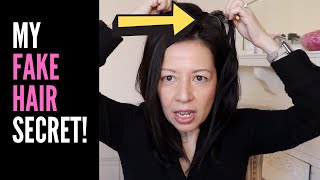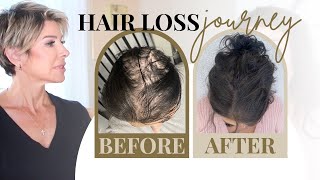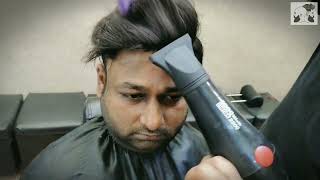Everything You Need To Know About Ginseng For Hair Growth

We know of all the things we use to aid us in attaining our goal of healthy hair, nature provides the best bounty. We have looked at a number of super foods, herbs and natural oils* that never fail to deliver and now we are going to focus on another one; ginseng.
This post will highlight the uses of ginseng for hair so that you can assess how it can help you in your journey to healthy hair.
You will no doubt be able to find ginseng in energy drinks, supplements*, tea blends and even shampoo and conditioner. The truth is you can find it in health food stores in the plant or powdered form, root form and perhaps even in the fruit, so there really is no shortage of options (having tried the shampoo and conditioner I think the tea makes a better choice for those who can’t stand the strong smell).
The thing that makes ginseng effective as a DHT blocker and hair growth booster is the compound known as ginsenosides.
So What Can Ginseng Do For Hair?
- Attack cancer cells that may lead to hair loss from chemotherapy.
- Relieves stress that can cause hair to shed prematurely
- Attack DHT that causes follicles to wither up and die too soon
- Help women with genetic balding to regrow hair
There Is Proof!
Now in most cases concerning herbs or natural remedies, the research to support glowing claims of benefits can be little to non-existent, thus leaving us to swim in a fog of uncertainty.
This probably has something to do with the fact that natural remedies can’t be patented for pharmaceutical companies to get a big cut or take credit for making them, but in the case of sound proof that ginseng assists people experiencing hair loss, we did manage to find some decent information.
Take a look at what a study done by Biol Pharm Bull had to say about the effects of ginseng on hair loss:
This study was conducted to test whether ginsenoside F2 can reduce hair loss by influencing sterol regulatory element-binding protein (SREBP) cleavage-activating protein (SCAP) and the transforming growth factor beta pathway of apoptosis in dihydrotestosterone (DHT)-treated hair cells and in a DHT-induced hair loss model in mice.
Results for ginsenoside F2 were compared with finasteride. DHT inhibits proliferation of hair cells and induces androgenetic alopecia and was shown to activate an apoptosis signal pathway both in vitro and in vivo.
The cell-based 3-(4,5-dimethylthiazol-2-yl)-2,5-diphenyltetrazolium bromide (MTT) assay showed that the proliferation rates of DHT-treated human hair dermal papilla cells (HHDPCs) and HaCaTs increased by 48% in the ginsenoside F2-treated group and by 12% in the finasteride-treated group. Western blot analysis showed that ginsenoside F2 decreased expression of TGF related factors involved in hair loss.
The present study suggested a hair loss related pathway by changing SCAP related apoptosis pathway, which has been known to control cholesterol metabolism.
SCAP, sterol regulatory element-binding protein (SREBP) and caspase-12 expression in the ginsenoside F2-treated group were decreased compared to the DHT and finasteride-treated group. C57BL/6 mice were also prepared by injection with DHT and then treated with ginsenoside F2 or finasteride.
Hair growth rate, density, thickness measurements and tissue histotological analysis in these groups suggested that ginsenoside F2 suppressed hair cell apoptosis and premature entry to catagen more effectively than finasteride. Our results indicated that ginsenoside F2 decreased the expression of TGF and SCAP proteins, which have been suggested to be involved in apoptosis and entry into catagen. This study provides evidence those factors in the SCAP pathway could be targets for hair loss prevention drugs. [2014;37(5):755-63]
Quite a bit of scientific gymnastics there for your brain, but the long and short of it is that the benefit of ginseng for those experiencing hair loss is no fluke! In case you are interested in doing more research, here’s a list of other studies on ginseng and its impact on hair growth:
- The ginsenosides of Panax ginseng promote hair growth via similar mechanism of minoxidil. -2015
- Red ginseng extract promotes the hair growth in cultured human hair follicles.-2014
- The inductive effect of ginsenoside F2 on hair growth by altering the WNT signal pathway in telogen mouse skin.-2014
- Effects of ginseng rhizome and ginsenoside Ro on testosterone 5a-reductase and hair re-growth in testosterone-treated mice.-2011
Final Considerations
Now just before you run out and stock up on some ginseng, we did find that there may be side effects to taking this for hair loss. Side effects include:
- Inability to sleep
- Headaches
- Nausea
- Breast pain or tenderness
For this cause, be reminded to consult a doctor before adding ginseng to your arsenal. It may be that you may need to discuss the measurements you are able to take ( if you are taking the brew), how often you can take it or perhaps which form of it is best for you.
So there you have it, another miracle from nature. Do you use it? would you consider using it for your hair care?




